Nagorno-Karabakh dispute and peace deal: What it holds for the world?
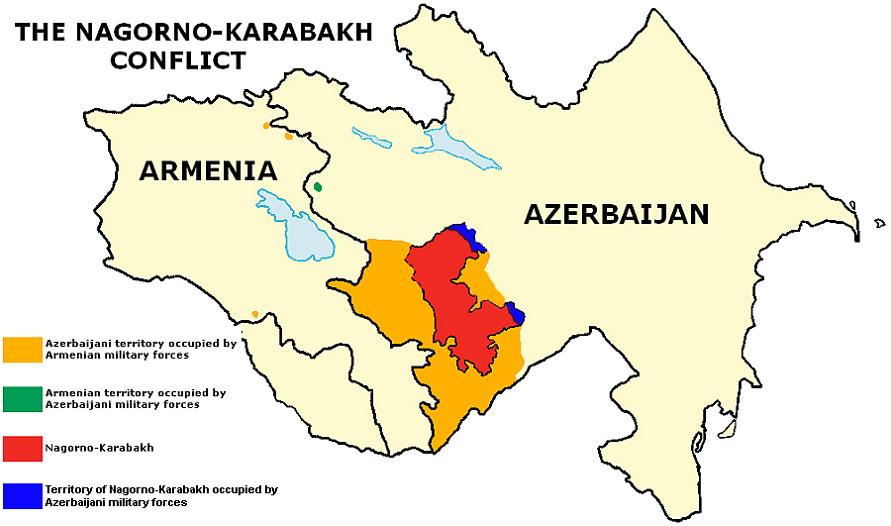
[responsivevoice_button voice=”US English Female” buttontext=”Read out this Theel for me”]
Have you ever felt the threat of being murdered in your own house? How would you feel if a car passes by your street and sleeping at your home you suddenly get startled to apprehend it as a drone to bomb you up the very next second? That is what civilians of Armenia and Azerbaijan have felt for the past few months. In fact, whenever a country is at war, its civilians feel the same because it’s the innocent civilians who face the repercussions of political and ground-field battles.
The international community recognises the region-in-conflict as a part of Azerbaijan as the erstwhile USSR gave the area to Azerbaijan but offered autonomy to Nagorno-Karabakh. Despite it being populated by the ethnic Armenians, Nagorno-Karabakh has remained part of Azerbaijan but has been controlled by separatist ethnic Armenians backed by the Armenian government. In the 1980s, with the receding Soviet power, separatist currents shot up in Nagorno-Karabakh. In 1988, the Nagorno-Karabakh voted to dissolve the region’s autonomous status and join Armenia. However, Azerbaijan suppressed such calls resulting in a military conflict. Since then, Armenia and Azerbaijan, the two former Soviet republics, have been at loggerheads over the contentious area. Soon, both jumped into the war. Despite a cease-fire of 1994, mediated with the help of Russia, the two witnessed sporadic clashes over the past three decades. Since then, the Organization for Security and Co-operation in Europe (OSCE) Minsk Group co-chaired by the USA, Russia and France have engaged both to resolve the conflict but all in vain. The clashes aggravated this September and developed into a war. The recent war reported thousands of casualties, displacements, and property losses on both sides, resulting in the most intense escalation since 2016. The escalation of clashes to this extent, even after three decades, shows the extreme failure of OSCE.
Regional players are playing a key role in aggravating the conflict rather than de-escalating it. Turkey and Israel have shown a strange union to back Azerbaijan against Armenia by providing military support. Pakistani troops were also secretly deployed. Turkey is at the fore to help Azerbaijan by supplying drones, Syrian mercenaries, and cluster bombs. This is despite the fact that the use and recruitment of mercenaries are legally forbidden by the 2001 International Convention against the Recruitment, Use, Financing and Training of Mercenaries (also known as United Nations Mercenary Convention), and the use, transfer, and stockpiling of cluster bombs is prohibited by The Convention on Cluster Munitions (CCM). However, Turkey has signed neither of the Conventions. Azerbaijan has signed and ratified the UN Mercenary Convention. Both the parties are accused of using banned weapons but neither Armenia nor Azerbaijan has signed the CCM. Using cluster bombs is deeply alarming, putting the civilians at high risk and this augments the humanitarian crisis.
UN Secretary-General António Guterres and countries like the USA and Russia have called for an end to hostilities. Armenia and Azerbaijan have however rejected pressure to hold talks for a month. In October, OSCE could finally put them on the table but the truce crumbled within hours and war broke out again.
The blatant humanitarian crisis because of mass bombings, population displacements and attached atrocities have become a norm across the borders. In this ethno-territorial stiff, it is innocents that are suffering.
The CSTO: Russia and Armenia
Usually, victim countries set aside any claims endorsed by aggressors of them shooting down the jets of the other countries. However, the opposite happened with Armenia and Turkey. Armenia said its fighter jet was shot down, killing a pilot, by Turkey but both Turkey and Azerbaijan denied it. This is because Armenia wanted to invoke Article 4 of Collective Security Treaty Organization (CSTO), a six-member military alliance, through which the attack on Armenia would be considered an attack on member countries, thereby involving Russia in the battlefield. As per the provisions of CSTO, it does not apply on the disputed territory of Nagorno-Karabakh but if the world agrees Turkey had attacked Armenia, then CSTO will come into operation. However, Russia has good ties with both Armenia and Azerbaijan and continues to sell weapons to both nations. Russia wants to avoid getting into this peddle and resolve it through talks peacefully because it apprehends that entering a full-fledged war might invoke NATO alliance of which the USA and Turkey are partners. However, this seems an unlikely situation as the US and Europe are not happy with Turkey’s aggression in the Mediterranean Sea and its involvement with Hamas terrorists. Moreover, with France and Russia being the P-5 countries, it is unlikely that the USA will take any action against Russia for Turkey in such circumstances. Technically, NATO gets invoked only when an aggressor attacks on the members and not when members are themselves aggressors and in the current scenario Turkey is itself, the aggressor. However, every effort of Armenia to make Russia enter the war failed.
On the other hand, entering the battlefield might have been fruitful to Russia as it could help Russia reclaim its lost influence in the central Asian countries. Russian aggression in Armenia could prove a setback for Turkey in Libya and Syria. Russia and Turkey are already at odds because of Russia’s intervention in Syria and Turkey’s shooting down of a Russian warplane in November. So, any showdown between Russia and Turkey will ramp up the tensions between them.
The peace deal
As per the new Peace deal brokered by Moscow on November 10, both sides will maintain positions in the areas they currently hold, thereby suspending all military operations. Around 2000 Russian peacekeepers will be deployed for five years along the line-of-contact in Nagorno-Karabakh and along the Lachin Corridor that connects the region to Armenia. The deal mentions that the internally displaced persons and refugees will return to the region and both countries will exchange prisoners of war and bodies; however, Broers said it could end up being a highly securitised area turning it into an awful place to live. Most of the Armenians have already left and won’t come back, and the remaining ones are also vacating the area gained by Azerbaijan, some setting their houses on fire upon leaving to show their anger, being forced to flee their homes. The deal meant a significant gain for Azerbaijan as it reclaimed over 15-20% of its lost territory. It brought a ray of celebration among citizens in Baku but prompted anger in Armenia over its defeat and led to a storm of protestors outside government offices in Yerevan. Armenia signed this painful deal because unlike Azerbaijan it cannot garner full-fledged support of any country and has already lost a considerable portion in the Nagorno-Karabakh region.
The strategic importance of Nagorno-Karabakh for the world
The Caspian region has rich oil and gas reserves whose export routes go through Russia (northwest) and the Caucasus (southwest). Europe aspires to reduce its dependence on Russia for energy needs. But, if the conflict in South Caucasus does not get resolved, Europe will have to keep this aspiration at bay. Not only Europe but a major part of the world depends on the region for energy needs as Azerbaijan has built several gas and oil pipelines across the Caucasus. Some of these pipelines pass close to the conflict zone (within 16 kilometres of the border). In an open war between the two countries, the pipelines could be targeted as Azerbaijan might be forced to close the pipelines for safety reasons to prevent oil spills and gas leaks, which would affect energy supplies and may even lead to higher oil prices globally. It also holds the possibility of creating ripples to escalate turmoil of the already crashed oil market that is trying to revive slowly.
The triangle of Armenia, India and Azerbaijan
India shares deep ties with both Armenia and Azerbaijan on one front or the other. India and Armenia share a deep friendship, good historical and bilateral relations, and almost total convergence over major bilateral and multilateral issues. Armenia has outrightly supported India over the Kashmir issue. It has a full vote in the United Nations General Assembly which is important for India’s push to gain a seat in case of an expansion in UNSC.
Azerbaijan connects India with Russia through Central Asia via International North-South Transport Corridor (INSTC) route, and with Turkey and beyond through the Baku-Tbilisi-Kars passenger and freight rail link. Moreover, India has its oil investments and growing cooperation in Azerbaijan at stake, if it sides with Armenia.
India has every reason to disregard Azerbaijan’s claims of territorial integrity as Azerbaijan has shown scant regard for India’s territorial integrity in the Kashmir issue with Pakistan. Still, India cannot appreciate Armenian claims either which are based on the principle of the right to self-determination due to the possible repercussions it can have for India as its adversaries like Pakistan may misuse it not only to make erroneous connections with Kashmir but also re-ignite secessionist movement in certain parts of India. Hence, India has no option but to choose a neutral and well-calibrated response and this is what India has done by upholding the method of mediation and negotiations to resolve the conflict between Armenia and Azerbaijan.
Seeing the reluctance of Russia to get physically involved in the Armenia-Azerbaijan dispute hitherto, despite the CSTO alliance, indicates that Russia is no more a reliable defence partner and holds a message for India concerning India-Russia defence cooperation. Russian President even warned Armenia that backing out from the Peace deal would be suicidal. Earlier Turkey openly said that it will resume military action if Armenia does not abide by the deal.
The world is facing colossal damage due to the ongoing pandemic. Humanity expects the world to be united at this moment at least, to carve out a solution to deal with the pandemic through international cooperation. Even the UN and other international bodies vouched that without global cooperation the pandemic will worsen. However, this does not seem to have any impact on the territorial-cum-political aspirations of the countries across the globe. The foremost question is what is more important—lives or territories? This game of tussle for territories is never-ending. Almost every country has territorial disputes with its neighbours, thanks to the legacy of undecided claims majorly left by the colonisers or similar rulers (at least in the developing nations). The pandemic has proven to be incapable of halting, even, for the time being, the wars or violent attacks across the globe.
With the brokered Peace Deal, a lot of questions are posed to the international community. How long will this truce survive? Will Azerbaijan be satisfied with what it re-captured and won’t it try to re-capture more in future? Does CSTO hold any purpose or strength in contemporary times? Will Armenia continue to be a part of CSTO or will it see options to exit it? Shall India look towards Russia as a reliable partner in its confrontation with China? Till when territorial interests will prevail over humanity?
References
- Explained Desk. (2020, November 11). Explained: What is the peace deal signed between Azerbaijan and Armenia?. The Indian Express.
- Recknagel, C. (2016, April 05). Explainer: Why The Nagorno-Karabakh Crisis Matters. Radio Free Europe/Radio Liberty. Retrieved November 07, 2020, from https://www.rferl.org/a/nagorno-karabakh-explainer-conflict-azerbaijan-armenia/27656158.html
- Roth, A. (2020, November 18). Putin warns Armenia backing out of Nagorno-Karabakh deal would be ‘suicidal’. Retrieved November 22, 2020, from https://www.theguardian.com/world/2020/nov/18/putin-warns-armenia-backing-out-of-nagorno-karabakh-deal-would-be-suicidal
Image Credit: Wikipedia


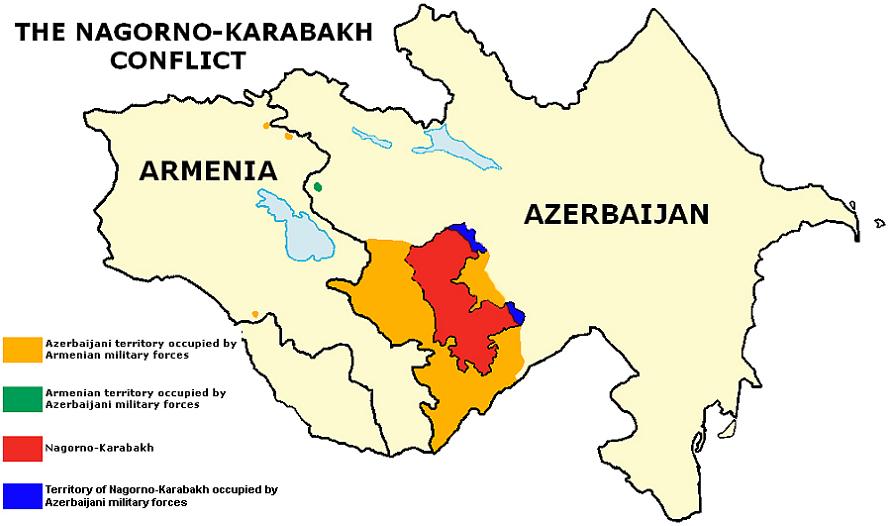
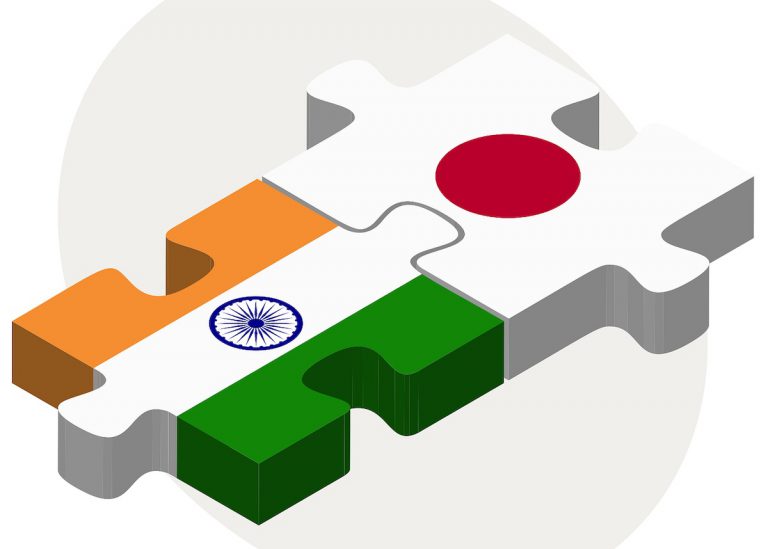
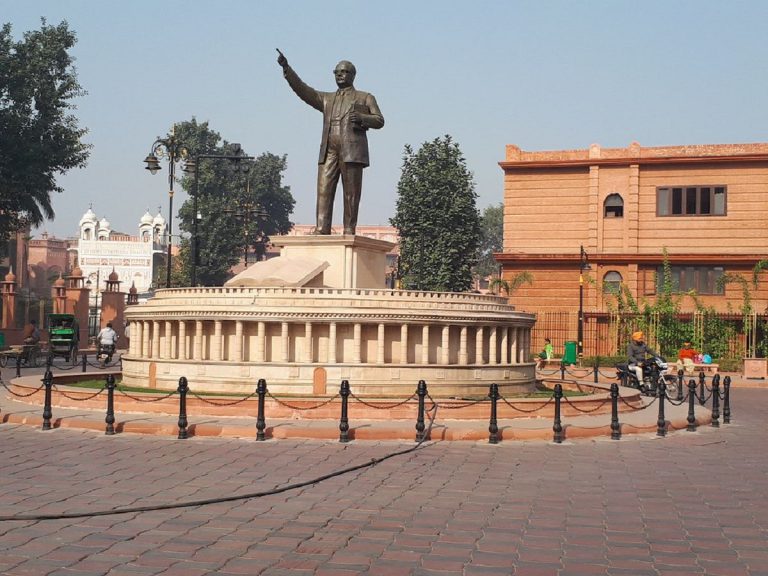

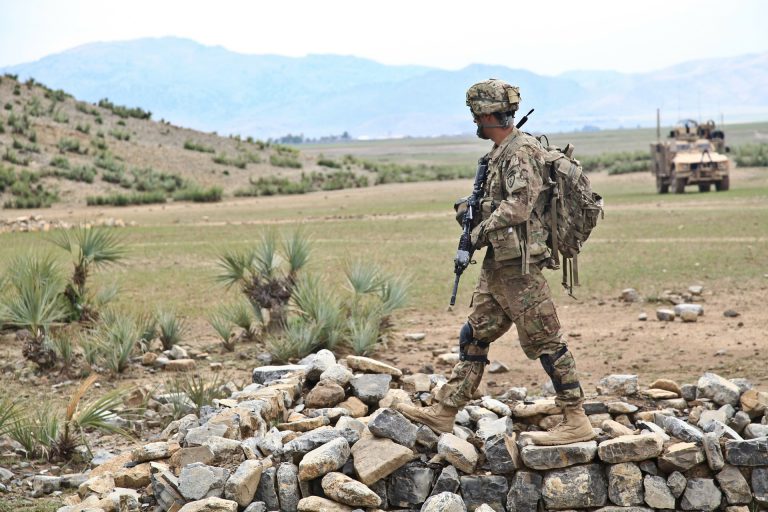
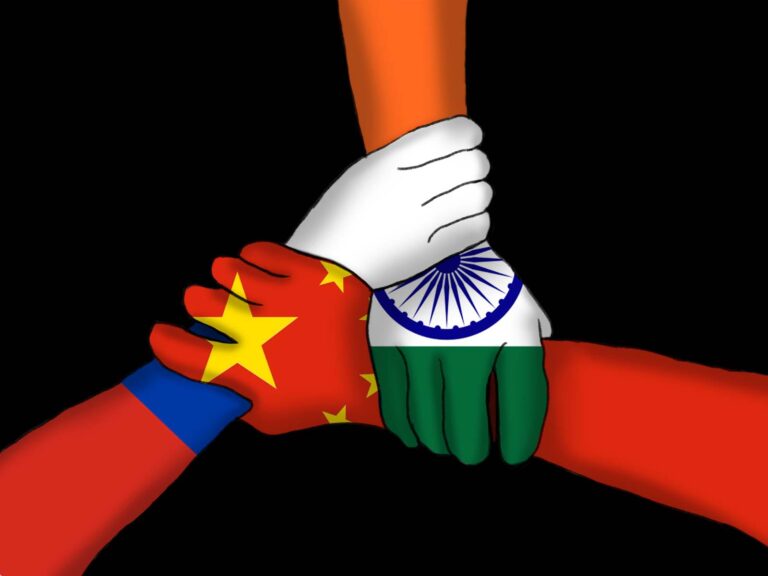

“On the other hand, entering the battlefield………lost influence in the central Asian countries”. This statement is factually incorrect, since Armenia and Azerbaijan are countries of Caucasus mountain region and not Central Asia. Kindly correct it.